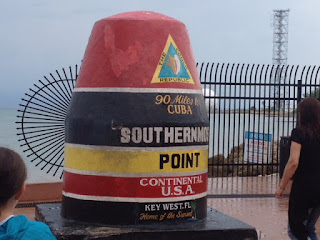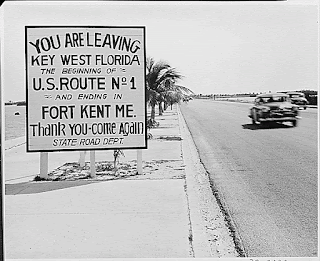Key West - US Highway 1 - Mile Marker 0
Key West,
Florida
US Highway 1 - Mile
Marker 0
After making our dives in Key Largo we wanted to really get
to know the area. Johnny and I had never been down to Key West. So, we decided to drive down and spend a
couple of days walking all over town.
Along the sidewalks were artists displaying their artwork; one
guy was showing his paintings of old time sailing ships, sailboats and speedboats
in the Keys. This was the old Key West with Hemingway's house and Sloppy
Joe’s bar. I am glad we got to see Key West and the Keys before it became
more populated and modern. I guess after 1990 the tourism in the Keys
really increased and the population grew. Key West became a real tourist town. Margaritaville was established and Duvall
Street became known for the coolest place to hang out in the Keys.
There seemed to be people gathering at “The Southernmost
Point in the Southernmost City – Key West” each afternoon in Mallory Square to
watch the sun slowly sink into the ocean.
We were amazed at how many people took the time out of their
day to stop what they were doing, come to the gathering place with other people
and enjoy that ritual of the sun slowly sinking below the horizon each
day. It put things into perspective. We
can often times be so busy and miss out on the small things going on around us
each day. It was a lesson that has
stayed with me all my life.
"See you at Sunset" has a special significance in
Key West, Florida. It's an invitation to
partake in a spontaneous celebration as jugglers, tourists, clowns, fishermen,
psychics, island musicians, artists, food vendors, and friends gather each
night to celebrate the close of another day in Paradise.
Many noted figures have enjoyed the view of sunset from
Mallory Square over the years. Audubon
wrote glowingly of the glorious Key West sunsets while visiting in the early
1800's, and legend has it that Tennessee Williams initiated the ritual of
applauding the sunset at Mallory Square, gin and tonic firmly in hand.
The contemporary incarnation of Sunset Celebration really
took off in the late 1960's as groups of carefree hippies descended upon Key
West and Mallory Pier in search of paradise. The way that the sunset
ceremony got started is that all the "freaks" as drug users were
called in the sixties, used to go down every evening high on LSD to watch
Atlantis arising mythically out of the cloud formations at sunset. There were about 30-40 regulars, many of whom
lived in Fogarty house.
The Key West Cultural Preservation Society, Inc. (a not for
profit corporation) in 1984 drafted guidelines for participation and
negotiated a lease with the City of Key West with the understanding that CPS
would manage Sunset and ensure its artistic integrity. The rest is history, as they say.
Sunset Celebration continues to be an internationally known
attraction that supports a cottage industry in Key West. It has become an incubator for the arts, and a
launching point for many visual and performing artists. Sunset can be credited
with attracting and inspiring the development of a generation of talent known
throughout the world.
We did the typical tourist things; visited Ernest
Hemingway’s house on Whitehead Street just around the block from Sloppy Joe’s,
the bar, where Hemingway hung out with his close friends (“the mob”) whose
adventures in around Key West are well known.
They drank, sport fished for giant marlin, and several were characters
in his books. Hemingway’s boat “Pilar”
named after one of his wives, was captained by Gregorio Fuentes. Fuentes also served as the basis for the
character Santiago, in The Old Man and The Sea and passed away in
2002 at the age of 104.
The Hemingway home was
built in 1851 in the Spanish Colonial style, and was constructed of native rock
hewn from the grounds. The home was in
great disrepair when it the Hemingway’s took ownership, but both Ernest and
Pauline could see beyond the rubble and ruin, and appreciated the grand
architecture and stateliness of the home.
The massive restoration and remodeling they undertook in the early 1930’s
turned the home into the National Historical Landmark that thousands of
tourists visit and enjoy today.
A unique and
extraordinary feature of the grounds is the pool, built in 1937-38, at the
staggering cost of $20,000. It was the
first in-ground pool in Key West, and the only pool within 100 miles. The exorbitant construction costs once
prompted Hemingway to take a penny from his pocket, press it into the wet
cement of the surrounding patio, and announce jokingly, “Here, take the last
penny I’ve got!” Tourists are invited to look for the penny, still embedded
between flagstones at the north end of the pool.
The Hemingway’s
personal touches still abound throughout the house. Many of the unique
furnishings are European antiques collected during their stay on the
continent. The trophy mounts and skins
were souvenirs of the Hemingway’s African safaris and numerous hunting
expeditions in the American west.
Ernest’s presence can still be felt in his studio where he produced some
of his most well-known works. In addition, very visible and living links to the
past are the descendants of Hemingway’s cats.
The story goes that Hemingway made the acquaintance of a sea captain who
owned an unusual six-toed tomcat, which captured Ernest’s fancy. Upon his departure from Key West, the captain
presented the cat to Hemingway. Today many of the numerous cats that inhabit
the grounds still possess the unusual six toes.
Ernest’s friends
Charles Thompson, Joe Russell (also known as Sloppy Joe), and Capt. Eddie “Bra”
Saunders, together with his old Paris friends became known in Key West as “The
Mob.” The Mob would go fishing in the
Dry Tortugas, Bimini, and Cuba for days and weeks at a time in pursuit of giant
tuna and marlin. Everyone in The Mob had
a nickname, and Hemingway was often referred to by his friends and family
during this time was “Papa”—it was a moniker that eventually stuck with him
throughout his life. Hemingway’s Key
West was a town unlike any place he ever experienced. It was filled with interesting people,
ranging from well-to-do businessmen and lawyers, to down-on-their-luck
fishermen, to shipwreck salvagers.
Throughout his career,
Hemingway freely used the people and places he encountered in his literary
works, and many Key Westers appear as characters in his novel “To Have and Have
Not,” a novel about Key West during the Great Depression. (Information gathered from The Ernest
Hemingway Home & Museum)
Johnny and I would dive the inner and outer reefs in Key
West, thirty to forty five foot depths with a sandy bottom. Each reef had
plenty of coral and beautiful fish swimming about. We did one night dive on the outer reef and
saw several large grouper and angel fish swimming around the coral wall of the
reef. We wanted to go out to dive Dry
Tortugas but found out it was about 70 miles west of Key West so, we decided to
stay and enjoy Duvall Street and the characters living in this wonderful,
eccentric town before heading north.
We took the Conch Train Tour around the city seeing the
sights getting the history and feel of the place that would later be called the
“Conch Republic”. It is a much different
Conch train tour today with added stops along the way but the same rich history
of the pirate days and the Cuban cigar making days in and around Key West. There are many celebrations throughout the
year including seafood, fishing, literary, Hemingway beard look alike just to
name a few. The annual “Meeting of the
minds” festival which is Jimmy Buffett’s Margaritaville parrothead convention
is the first week in November just after the wild and crazy Fantasy Festival.
Ice






Comments